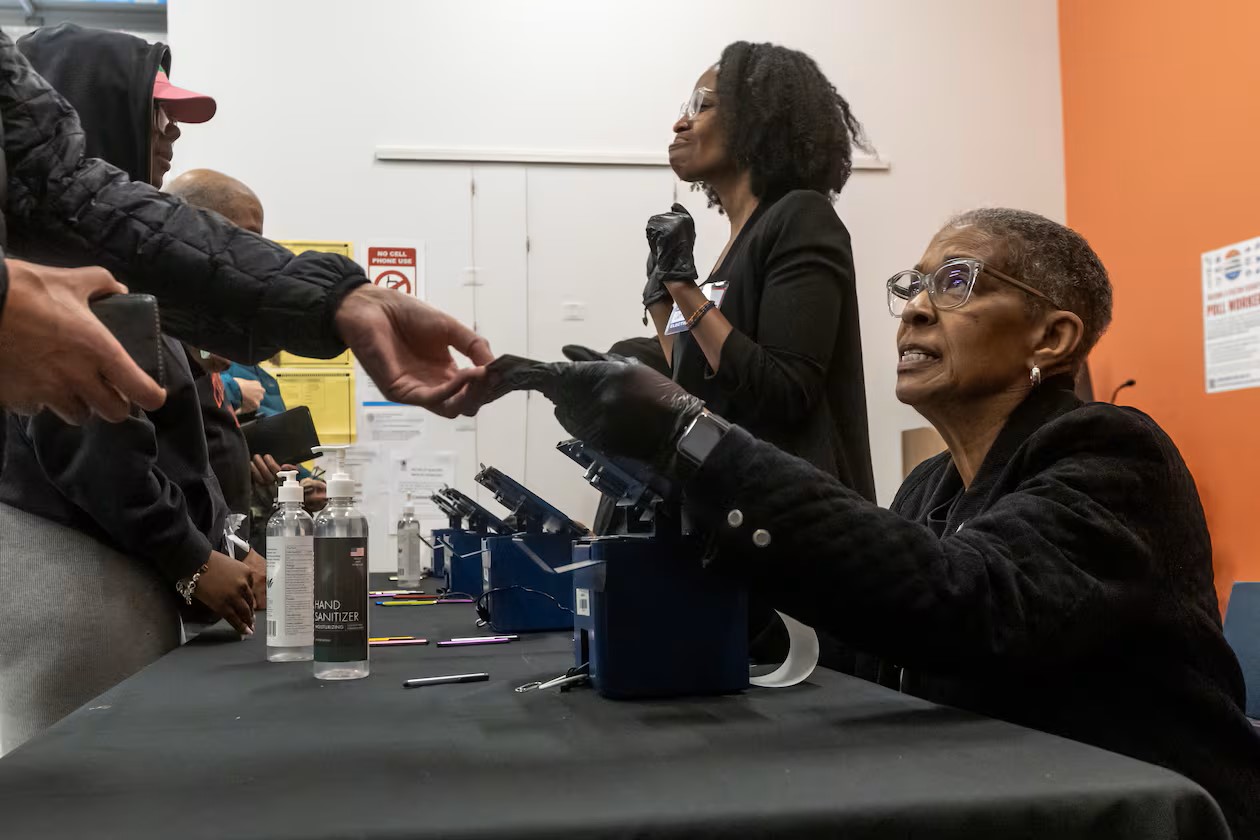As Georgia opens its polls for the 2024 election, a record-breaking number of early votes have been cast, signaling heightened voter engagement in one of the nation’s most fiercely contested battleground states. On Tuesday alone, over 328,000 ballots were submitted, far surpassing the state’s previous first-day voting record of 136,000 in 2020. Gabe Sterling, a senior official from Georgia’s Secretary of State’s office, announced the impressive turnout on social media platform X, marking a momentous start to what promises to be a pivotal election.
Georgia’s status as a swing state has garnered national attention, particularly as former President Donald Trump seeks to reclaim the state he narrowly lost to President Joe Biden four years ago. Trump’s 2020 defeat in Georgia, by just 11,779 votes, led to a series of unsuccessful efforts by the former president and his allies to overturn the results. This year, Georgia’s political landscape is even more fraught with legal disputes over new election regulations, many of which are being challenged in court by Democrats and civil rights groups.
The record-breaking turnout on the first day of early voting underscores the importance of Georgia in this election. For many voters, the stakes are higher than ever. Political analysts have pointed to Georgia’s critical role in determining the outcome of the presidential race, as well as the state’s influence in shaping the balance of power in Congress. With legal battles raging over recent election reforms, this year’s election could serve as a bellwether for the future of voting rights and election security in the United States.
Among the most controversial changes to Georgia’s election laws are new restrictions on absentee ballots and the reduced availability of drop boxes. In 2020, drop boxes were a popular method of voting, particularly during the COVID-19 pandemic, as they were available 24/7. This year, however, there are fewer drop boxes, and they are only accessible during limited hours, which critics argue could disenfranchise voters who cannot vote in person. Despite these restrictions, Georgia’s Secretary of State, Brad Raffensperger, reported that more than 250,000 absentee ballot requests had already been processed, with that number expected to rise to 300,000 before Election Day.
Raffensperger, who has been at the center of Georgia’s election integrity debates since 2020, assured voters that safeguards are in place to ensure a fair and transparent election. In addition to routine audits of election results, Raffensperger has ordered random inspections of voting equipment to prevent tampering. “We will be conducting random audits of voting machines on Election Day to verify that they are recording votes accurately and have not been compromised,” Raffensperger said during a press conference on Tuesday.
The smooth start to early voting in many areas of the state has been a relief to voters and election officials alike. In Atlanta, Corine Canada, a voter who participated in early voting, noted the improvements in the voting process compared to previous elections. “Last time, the lines were so long, people started leaving because they couldn’t wait,” Canada said. “This time, it was much more organized, and I was able to vote quickly.”
The election is taking place as parts of Georgia continue to recover from the devastation caused by Hurricane Helene, which swept through the region last month. Despite concerns that the storm might disrupt election preparations, Raffensperger confirmed that absentee ballots had been mailed out on schedule and that the hurricane had not affected the state’s voting infrastructure.
While the early voting process appears to be running smoothly, legal challenges to Georgia’s new election laws are ongoing. On Tuesday, Fulton County Superior Court Judge Robert McBurney temporarily blocked a rule that would have required officials to hand-count ballots at polling locations. McBurney criticized state election officials for approving the rule so close to Election Day, suggesting that it could create confusion and delays. The rule will be revisited in court later this week as part of a broader legal challenge to the new regulations.
Another rule under scrutiny requires local election officials to conduct a “reasonable inquiry” into results before certifying them, a measure that Democrats argue could lead to delays in the certification process. However, in a ruling earlier this week, McBurney clarified that local officials have a “mandatory obligation” to certify election results within a specified timeframe, dealing a blow to Republican officials who had argued for greater discretion in the certification process.
As the legal battles continue, Georgia voters are making their voices heard at the polls. In an Atlanta-area precinct, voters expressed a range of motivations for participating in this year’s election. Fay Ainsworth, a self-identified Democrat, said she voted to prevent the kind of “chaos” she associates with Trump’s presidency. “We need to vote today to stop the chaos that Trump has brought to this country,” Ainsworth said. Her companion, Joseph Henry King Jr., 77, echoed her sentiments, praising Vice President Kamala Harris for her leadership. “We’ve got a crazy person running for president and a very competent woman opposing him,” King remarked.
Independent voter Kareem Rosshandler, 32, who voted for Green Party candidate Jill Stein, said he cast his ballot as a protest against U.S. foreign policy, particularly the Democratic Party’s support for Israel in its conflict with Hamas. “We’ve been calling for an arms embargo, and voting is the only way to send that message,” Rosshandler said. He also voiced support for the Green Party’s proposal to abolish the Electoral College, arguing that it would create a more representative electoral system.
As Georgia’s election progresses, the state remains at the center of national attention. With record early voting numbers, contentious legal disputes, and a politically engaged electorate, the outcome of this election will have far-reaching implications not only for Georgia but for the entire country. The results could reshape the future of U.S. elections, influencing how Americans vote, how elections are administered, and how the nation addresses issues of voting rights and election security in the years to come.
These early voting trends, combined with the ongoing legal challenges and the broader political stakes, suggest that Georgia will play a defining role in the 2024 election cycle. As the state moves closer to Election Day, all eyes will remain on Georgia to see how the process unfolds and what the results will mean for the future of American democracy.
Both articles offer in-depth analyses of the developments surrounding Georgia’s early voting turnout and legal disputes, reflecting the state’s critical role in the 2024 election.









